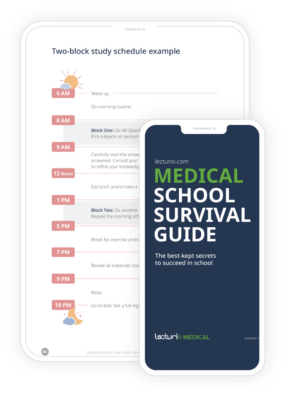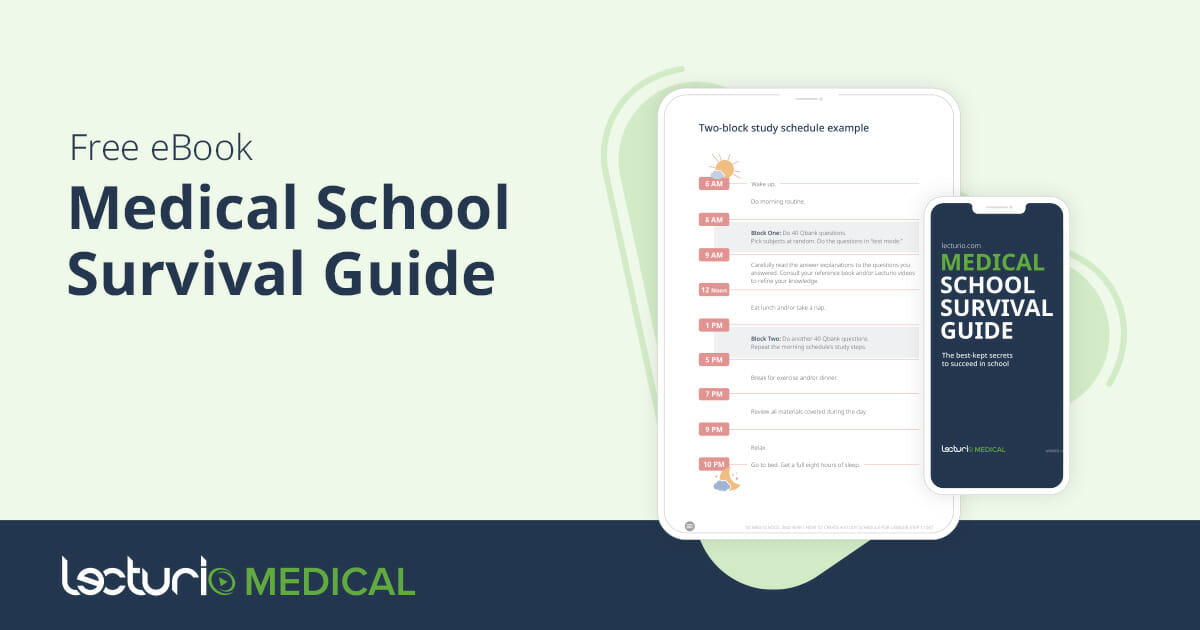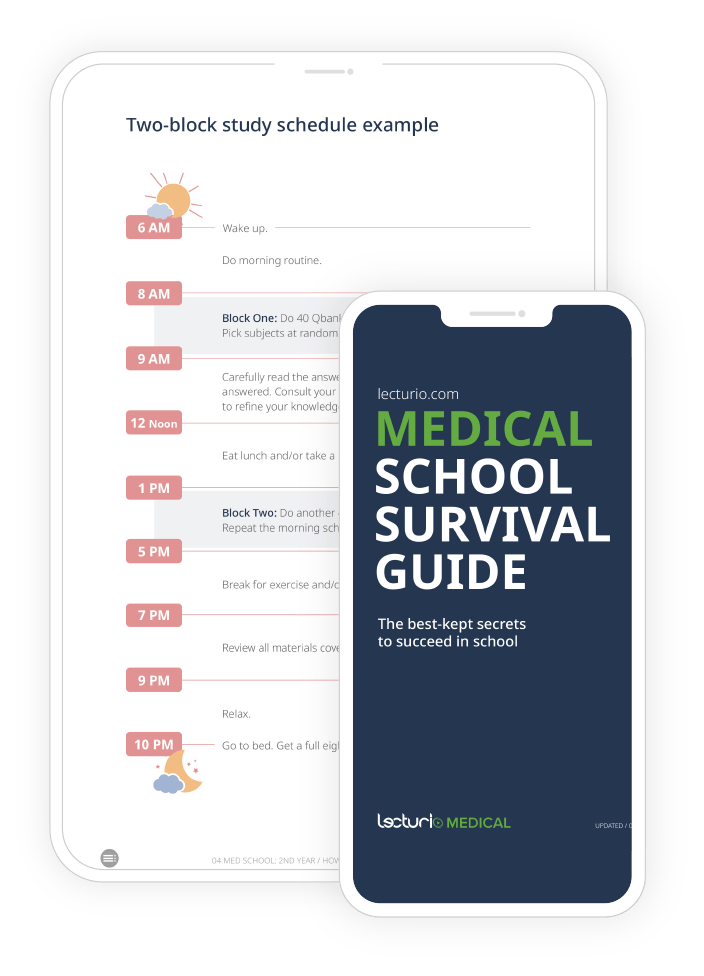Much of what follows is from my own experiences and those of my friends. Our experiences may be different, but most of us know the fear of failure and in medical school, a lot of us – if not all – know what it’s like to fail to some degree. Some people say the first failure is the hardest. Actually, each failure will be different and you’ll have something to learn from each one.
Getting Bad Grades in Medical School
I’m not going to sugarcoat it: most of us fail at least once in medical school. Unless you’re one of those rare students who can absorb knowledge like a sponge, failure is all part of the process. Being medical students, many of our ideas of ourselves come from being smart and surpassing our own expectations and those of others.
I consider myself an average student at my school. I’m not a stellar student nor do I have trouble studying. But there were courses where I got bad grades. Everyone has that one subject they just can’t get…
The first time I failed was my ENT exam. It was my first year in medical school and I wasn’t used to failing. With this exam happening early in the year, I genuinely thought I didn’t belong in medical school because of it.
Looking back, it now seems not that important. But at the time it was a big deal for me.
I was forced to change how I studied and experiment with other approaches. Eventually, I found my groove. The key is to adjust: flexibility is just as important as working hard.
So, how can we deal with these bad grades?
Everyone has different ways of coping and coming to terms with their own limits. Even if getting bad grades is common in medical school, it still hurts to get them. However, what matters at the end of the day is picking yourself up and moving on. Here are some tips that might help:
- Learn to study smarter, not harder. Know your limits and when you can push them. There’s such a thing as oversaturating yourself with information. You can only take in so much. Be efficient with your time and effort. Do trial-and-error with different strategies if you need to as you find your own study style.
- See the school counselor or your mentor. Perhaps you have trouble studying because you’re stressed or you have trouble organizing what you need to do. Seeing someone who specializes in studying and medical school might help you get back on track.
- Know what areas you need to work on. You need to find the root of the problem before you can start fixing it. This is where I found the short quizzes on Lecturio particularly helpful. They track your progress and they have explanations to correct you.
- You are not your mistakes. Grades are not the be-all-end-all of medical school. While they do matter, you can’t let your grades discourage you. Grades don’t define a good doctor.
- Remember that you made it this far for a reason. You’ve gone through your pre-med, passed a medical school admissions test, and gotten admitted into a medical school. Failure is when imposter syndrome goes into overdrive, but you have to remember that you belong in medical school.
- Find your pick-me-up. When you fail, there’s not much you can do to change the outcome. That’s the harsh reality of it. So what matters is to bounce back. Spend some time mourning over your failures. That’s fine. But also take the time to remember why you started in the first place and go do something you love. Eat the food you like. Watch your favorite movie. Be with your friends and family. Then, when you’re ready, get back in the game.
How Many People Fail Medical School?
In 2020, the Association of American Medical Colleges (AAMC) found that the average graduation rates in U.S. Medical Schools are 81.6% to 84.1%.
Meanwhile, the attrition rate (the rate at which people leave) is at 3.3%. It can seem like a small number, but it can happen to the best of us.
There are many reasons why medical students fail in their academics. Much of the time, it’s for reasons they can’t control. Maybe they lack the resources to study the workload, have medical conditions, or just realize that they don’t want to study medicine anymore.
Either way, failing out of something you worked hard for can feel discouraging. But if you want something enough and are willing to put in more work, you can make it. It’s not easy finding a new medical school, repeating another year, or even finding a new vocation. Yet I’ve seen people time and time again proving that grades don’t determine their worth. They are the strongest people I know. Strength to me isn’t about how perfect a student you are. It’s getting up despite everything telling you to stay down.
Studying medicine has never been easier.
Set yourself up for success with Lecturio.
Repeating a Year of Medical School
When you decide to go to medical school, you have to recognize that failing a year is a possibility, no matter how smart you are. For many medical students, who are usually the kinds of people who rarely fail, it’s a terrifying prospect. What they don’t realize is that there’s no shame in repeating a year. In fact, repeating a year should be a sign that you’re sure that this is what you want. It means that you want to keep trying.
When I entered medical school, I saw a lot of people repeat a year.
Whether it was for academic or other reasons, it can happen to any of us. Many of them spent that year figuring out what they wanted and studying on their own. By the time I saw them in the hospitals with me as clerks, they knew a lot more than I did. In fact, they had mastered the subjects that they failed because they took them twice.
Repeating a year of medical school doesn’t make you any less of the student that you were. If anything, it makes you stronger because it means you were able to face what most students are afraid of. Everyone grows at their own pace. Graduating on time doesn’t make you a great doctor, but being determined does.
Accepting Your Mistakes and Failures
No one likes failing. It’s natural to be scared of failure, but it’s also natural to fail. Like many fears, most if it is in the mind. While there are some factors out of your control, your mindset is something within your control. Here are some things you can do to change your failure mindset into one geared toward growth:
- Accept that mistakes are part of the process. We all make mistakes. No matter how “small” they may seem to others, they matter to us. I’ve had my fair share of mistakes where even the patient laughed at how I fumbled. All those confident doctors you see in the hospitals were students like you once, making mistakes. What made them confident doctors was that they learned from them.
- Celebrate what you did right. Even if we do make mistakes, there are also things we get right. They can be the small successes or even the fact you simply made it to medical school. When I was in 2nd year, after every exam, whether I passed my exam or not, I always ate out with my friends. It’s not always about results. Celebrate the efforts you made.
- List your weaknesses. Make a list of topics you find hard to understand or where you feel lacking. Find the time to go over those topics and see how you can improve. Ask for feedback from your teachers or take note of your mistakes after an exam, because you actually learn better from mistakes than if you had no mistake at all.
- Start using the word “yet.” Instead of saying things like “I can’t do that” or “I don’t know,” replace it with “I can’t do that yet” and “Sorry, I don’t know that yet.” A common saying on the floors is “I’ll read up on it, doc.” Talking about the future changes your perspective from who you are now to who you want to become.
- Find your inspiration. It’s not enough that you pick someone successful. It doesn’t even have to be someone in the medical field. You just need someone who knows how to bounce back from their failures.
- Ask for help. Part of growth is knowing when you need help. You have your mentors, friends, family, and school to support you. I can never emphasize enough how the help of a few people during your darkest times can go a long way.
A Final Word
Medicine is not for the smart nor the innately talented. It’s for those who learn from their failures and persevere because medical school will beat you down. There will be days when you think you can’t keep going, but you will get up anyway because it means that you’re trying. Trying your best is enough.
I know that it can be frustrating. Medical school made me feel that way more times than I can count. I’ve cried, screamed, and struggled through all the piles of concepts I had to study to get where I am. If you feel lost, it might help to look back and look at how far you’ve come. Then, slowly but surely, find a way to keep going.







